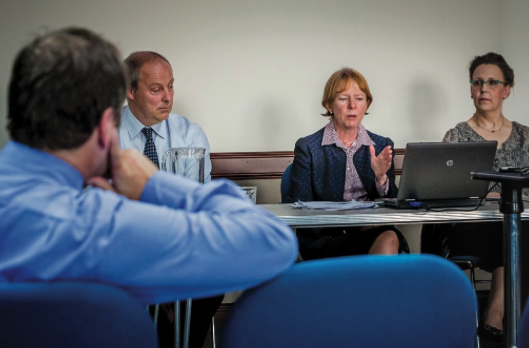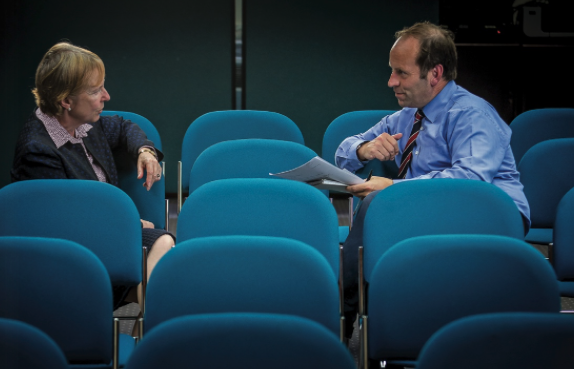

If you stop someone you know on the street for a chat, and ask, “how’s work,” you will nearly always get the answer: “really busy.” But the statistics don’t agree. Official stats show that we are all getting less productive with each year that passes – so, even if we truly are “really busy,” we’re still producing much less with our time – 22% less than we were in 2007.
And that’s a real worry for everyone, once you add in the critical fact that the population is aging - meaning there will be progressively fewer people working to support those who either can’t work or have retired. And so if those working people continue to be less and less productive…
At its simplest level, lower productivity probably means lower average incomes, which is one the reasons why successive Councils of Ministers have tried unsuccessfully to halt the downward spiral. So far, they have failed, meaning solving the productivity problem is now front and centre for the new States Assembly, which we will elect next May.
To help them out, Express spoke to the Chair of Jersey’s Fiscal Policy Panel, Dame Kate Barker:
Kate Barker: Fundamentally, productivity is best thought of as what people make in an hour. How do measure it? Well, of course it’s really easy if you’re making, say, cars because you can say we’ve got 100 people in the factory, making 100 cars a week, that’s one car for one person, and break it down into an hour. It gets much more difficult to measure if you think about the big industry here, financial services; how do you measure it? The size of the financial transactions? The number of the financial transactions? It’s slightly more slippery, so in Jersey, one of the ways in which GVA tends to get picked up is actually through profit, rather than through productivity.
It’s also quite difficult in the services sector, hotel guests or that kind of thing. Expensive hotels have lots of staff - it doesn’t mean they’re not productive though, because the service is what people are paying for. So, there are lots of difficulties - but cutting through all of those difficulties, fundamentally the reason it’s important is because it is the service you provide that enables you to have income to spend on other things. If you’re not producing very much in terms of physical goods, or a service, you won’t earn enough income, and that’s why it matters so much for Jersey.
The issue for Jersey is that because productivity has not been great in the financial sector, for reasons really partly to do with the low interest rates, and in the non-financial sector for reasons that we don’t fully understand, incomes in Jersey have not risen - so if we want income to rise in Jersey over the medium term, and I’m certain everybody would want that, we have to get output per hour up.

Pictured: "It’s very clear to anybody I think, thinking about the Jersey economy, that there’s always uncertainty about the future of the financial sector," says Dame Kate Barker.
Express: How concerned should we be that productivity in Jersey has fallen significantly?
KB: I think that is alarming, but as I say, financial services productivity is very hard to measure, and it’s easier to understand why we have this apparent decline in financial services productivity because of the fact that interest rates are lower. It doesn’t imply that all the people in financial services have become less industrious. They’re not sitting around with their feet up. They’re actually working quite hard, but really not making as much money.
What’s also disturbing is that Jersey, in common with a lot of other countries following the financial crisis, has had a fall in its rate of productivity growth outside of the financial sector, and indeed has done slightly worse there than other countries. Now, to some extent, we’re all very puzzled.
Why on earth, following the financial crisis, is productivity so low? One of my colleagues at the Bank of England, Adam Posen, had a discussion about whether productivity growth will pick up again, and I said, “…why wouldn’t it?” We used to have productivity growth, why haven’t we got it now? That’s a big question. We still don’t really know why we haven’t got productivity growth back up. There are various explanations, but in quite a lot of countries, and I think it’s true in Jersey as well, companies haven’t invested so much.
Now there’s a couple of reasons why they might not have invested so much, and of course it’s often investments in machinery or technology that helps to boost productivity, or indeed investment in training. It may be that they are uncertain about the future, and somehow the financial crisis has left a lot of us uncertain about our future - and of course if you’re not investing to get your output up you’ve got to employ lots of people. That’s the sort of inefficiency of it.
Or it may be something else, which perhaps is a bit harder to understand in Jersey because it’s come from a different background; but something I’m sure is true in the UK, is there are fewer people in unions, and actually the power of labour seems to have diminished.
So, even though unemployment has fallen dramatically in UK, and it has also fallen substantially here, you don’t see a lot of pressure for higher wages - and indeed we see a lot of people at the bottom end of the labour market who aren’t really doing very well at all; and in some sense in the UK, we’ve solved it by introducing this higher minimum wage, and that has helped to tackle that. I understand why that’s happened, because of course we regulate labour markets very considerably, so it’s a real question for us as to whether we can make a labour market to get a bit more going forward.
Express: Is productivity particularly important for Jersey given the aging population?
KB: Yes, that’s one of the longer-term challenges we’ve talked about. It’s very clear to anybody I think, thinking about the Jersey economy, that there’s always uncertainty about the future of the financial sector; and certainly, the direction could be that the financial sector does better in the future, because Jersey has been very successful at selling itself as a good transparent place to put financial business.
But that uncertainty, combined with the fact that Jersey has a very unfavourable demographic future, you know it anticipates quite an aging of the population, and that will mean that either people are going to have to work until they’re older, or the people who are working will have to produce more in order to support the people who are not working. Fundamentally, this is a big question for the new government when they come in.
The present government I think has gone done a good job in getting the public finances back into balance following the financial crisis, but they haven’t been able to solve these productivity conundrums, and that’s the problem for the next government.

Pictured: For Dame Barker, what would make a difference is if "people felt in some deep sense that the financial crisis was over."
Express: Has anyone, worldwide, solved productivity?
KB: No, unfortunately we haven’t, and it will be interesting to see whether as we start to see interest rates pick up, we will see a shift back towards people thinking actually we need to use a bit less labour, and a bit more capital; interest rates rising might put them off, but I don’t think it will.
I think the thing that would really make the difference is if people felt in some deep sense that the financial crisis was over. Well, you might say, “…of course it’s over, we had it a long time ago,” but the fall in interest rates, the big rise in asset prices, a lot of uncertainty - you know, will equities stay this strong - all those things weigh on companies when they are making long-term capital decisions, like should I buy a new plant, should I install a whole new computer system?
They are more reluctant to do that if they feel the future is uncertain, so while that is still going on, it may be harder to solve productivity for them; so, I’m not saying this is easy, but it has to be something that Jersey has to think about. It has to think about do companies use digital technologies? What are the barriers to people being more productive?
Express: Is this the most uncertain time that we have lived through?
KB: I have a terrible feeling we always say that. I can remember many uncertain times previously; but let’s end on a positive note, because firstly the non-finance sector in Jersey may very well find itself forced to become more productive, because it will find it harder to get the people it wants, and that might turn out to be a good thing; and the finance sector with new technology coming in, and interest rates rising that too may start to look a bit more productive.
So, let’s not be too gloomy. Let’s say actually the trend could be starting to tick up over the next two to three years, and then if that happens that would be great news and it would help a lot with the long-term challenges we are talking about.
Normally, economists would think of an economic crisis causing productivity to fall sharply, and then rise again. This very long trend of very low productivity has surprised all of us but, no, just when it picks up in a year you can’t just assume it will carry on, because it can be due to a particular set of circumstances; so being sure we’ve got onto a better trend will be a while yet.
This interview also appears in the business magazine, Connect, here.
Comments
Comments on this story express the views of the commentator only, not Bailiwick Publishing. We are unable to guarantee the accuracy of any of those comments.